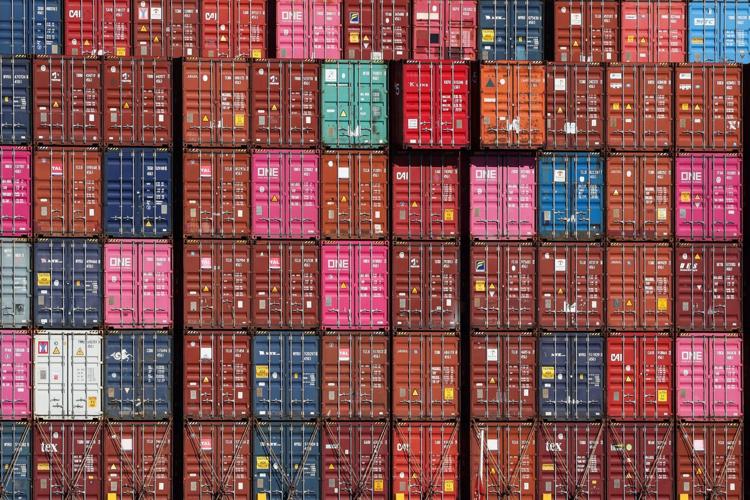Hong Kong (CNN) — China unveiled retaliatory tariffs of 84% on imports of US goods on Wednesday, matching additional tariffs imposed by US President Donald Trump earlier in the day and further inflaming a trade war between the world’s two biggest economies.
Trump’s sweeping “reciprocal” tariffs took effect earlier on Wednesday. China was the hardest-hit nation with a levy now totaling at least 104% on all its goods. The two countries have been involved in a game of tit-for-tat on trade, with Beijing standing firmly against each new tariff introduced by Washington.
“The US escalation of tariffs on China is a mistake upon mistake, severely infringing upon China’s legitimate rights and interests, and seriously damaging the multilateral trading system based on rules,” China’s State Council Tariff Commission said in a statement announcing the fresh levy.
The amped-up retaliation comes after China repeatedly warned that it would “fight to the end” if the US moved forward with further tariffs.
On Wednesday, Trump’s additional levies on Chinese imports had originally been set to increase by 34 percentage points. But the president tacked on another 50 percentage points after Beijing refused to back down from the standoff. Prior to the most recent rounds of escalation, Trump had already imposed 20% levies on China.
The back-and-forth between the superpower economies has sent global markets mostly lower, with US stock futures tumbling Wednesday after Beijing announced its most recent escalation.
“This is getting so ridiculous that it’s hard to believe it’s actually happening between the two largest economies that make up almost $50 trillion of global GDP, almost half of the world – let alone a tariff war against the whole world,” Peter Boockvar, chief investment officer of Bleakley Financial Group, wrote in a research note.
In addition to the increased tariff levy, China’s Commerce Ministry imposed export controls on 12 American companies, barring Chinese companies from supplying them with dual-use items that have both military and civilian applications.
It also added six more US firms to its “unreliable entity list,” banning them from trading or making new investments in China, and filed a complaint to the World Trade Organization over the latest US tariffs.
US Treasury Secretary Scott Bessent has shrugged off China’s retaliatory moves, telling Fox Business on Wednesday that it is unfortunate that China does not “want to come and negotiate” a tariff deal. He called China the “worst offenders in the international trading system.”
“They have the most imbalanced economy in the history of the modern world, and I can tell you that this escalation is a loser for them … They’re the surplus country,” Bessent said. China’s “exports to the US are five times our exports to China. So, they can raise their tariffs. But so what?”
Bracing for impact
As Trump escalated his tariff war, the message from the Chinese government, state media and opinion leaders alike has been one of defiance, voicing their determination to strike back while leaving the door open for negotiation.
Shortly after the latest round kicked in on Wednesday, a Chinese Foreign Ministry spokesperson told reporters that US needed to “demonstrate an attitude of equality, respect and mutual benefit” if it truly wanted to resolve the trade war through dialogue.
China also released a white paper on its trade and economic ties with the US, saying that relations had been damaged by the “unilateral and protectionist measures” taken by Washington.
In a written Q&A about the white paper, an unnamed Commerce Ministry official emphasized that China does not want a trade war, but said Beijing would “never sit idly by” while the legitimate rights and interests of the Chinese people are “harmed or stripped away.”
Despite the defiant tone and calibrated confidence, China is bracing for impact to its export sector, which has been a bright spot in its otherwise slowing economy. Last year, trade between the US and China totaled roughly half a trillion dollars.
“If the US insists on further escalating trade restrictions, China has the firm will and ample tools to take resolute countermeasures — and will see it through to the end,” said the official.
The successive rounds of tariffs come as China has reveled in a feeling of greater economic vitality following years of grappling with a crisis in the property sector, high local government debt and the fallout from Beijing’s pandemic controls.
Last month, the Chinese government announced a slew of measures to rev up domestic consumption as it anticipated the impact from Trump’s trade policy on its export-powered growth.
This story has been updated with additional reporting and context.
The-CNN-Wire
™ & © 2025 Cable News Network, Inc., a Warner Bros. Discovery Company. All rights reserved.


